Evidence is great – there’s nothing quite like a science study to help prove your point. But one thing frequently left out when presenting that evidence, especially in the news coverage surrounding it, is industry funding.
Industry funding and its potential cause for bias is something we need to speak about in the age of viral and fake news. There’s no shortage of news stories touting studies telling you that various products from dairy, to vegetables, to even water are better or worse for you than you thought. But we need to know how to read these news stories.
It isn’t like this is anything new. Last year, scientists published a landmark report finding that in the 1950s and ’60s, a sugar industry trade group funded studies downplaying sugar’s association with coronary heart disease, instead pinning fat or cholesterol as the major cause. But even still, industry funding is ubiquitous – every once in a while, our Facebook feeds will be attacked by a “X is better than we thought” story… funded by X.
And this funding really does seem to introduce a bias. Marion Nestle found in an unofficial study that 90 per cent of industry-funded nutrition studies rule in favour of the funder’s food.
Probably this year’s most egregious example was a dairy industry-funded study finding that eating cheese wouldn’t cause a heart attack or a stroke. Its conflict-of-interest statement was about as long as this story is – one author consulted for Nestlé and was on a McDonald’s advisory board, for example. Plenty of news articles on the story left this fact out.
That study analysed a huge number of folks, but had some potentially eye-raising decisions. For example, it was a study on heart attack or stroke risk, but its data did not include anyone with prior cases of cardiovascular disease, diabetes or other chronic disease.
The reason we’re bringing this up is that we’re in the era of fake news, and you should be able to tell when that story your parents or friends are sharing is true or not. And, while industry funding doesn’t discount a study’s conclusions, you should always check with the science paper (or scientist… or news reporter) who funded the research you’re reading about.
